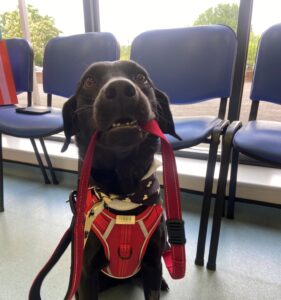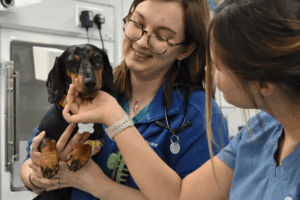In 2024, the British Veterinary Nursing Association (BVNA) is celebrating two decades of campaigning during the month of May! To celebrate this year’s Veterinary Nursing Awareness Month, and to showcase the wonderful work of veterinary nurses around the world, we’re sharing an insight into #WhatVNsDo.
If you’re curious about veterinary nursing, or considering embarking on this field as a career, this blog has all you need to know.
Role of a Registered Veterinary Nurse (RVN)
RVNs have an essential role in caring for sick, injured and hospitalised animals, and are highly valued members of our team here at St Kitts.
Typical duties can include:
- Carrying out nurse consultations including puppy, kitten and elderly patient checks
- Supporting animals and their owners before and after procedures
- Preparing patients for surgical procedures
- Assisting in the operating theatre
- Diagnostic imaging including taking radiographs
- Providing nursing care and monitoring of patients in the wards, for a variety of species and conditions
- Taking samples and carrying out diagnostic checks in the laboratory
- Triage of emergency situations
How can I become a Registered Veterinary Nurse?
To become an RVN, you’ll need to complete a Veterinary Nursing qualification approved by the Royal College of Veterinary Surgeons.
There are two types of training:
Vocational training
A Level 3 Diploma in Veterinary Nursing usually takes between 2-3 years to complete full-time and is carried out alongside employment in a veterinary practice.
Higher education
A Foundation Degree in Veterinary Nursing or BSc (Hons) Veterinary Nursing usually takes 3-4 years to complete. It is more academically focused however a significant proportion of the course involves work-based training at an approved training practice.
Entry requirements
For the vocational training route, a minimum of 5 GCSE’s (alternative qualifications may also be considered) at grade C / 4 or above is required; these must include Science, Maths and English. Additional qualifications, such as A-levels, are required for enrolment onto a higher education course.
The majority of courses require students to have relevant work experience before applying, to develop animal handling and restraint skills, as well as obtain an insight into life as a veterinary nurse.
The demand for places on any Veterinary Nursing course is highly competitive. We always recommend that students gain as much practical experience as possible, regardless of the route they chose to take to qualify.
Work experience could include:
- Veterinary practices
- Rescue shelters
- Kennels / catteries
- Farms
- Groomers
Join us for work experience at St Kitts Vets
Here at St Kitts Vets, we’re proud to offer placements for both work experience and university students. Our placements provide hands-on experience and the opportunity to immerse yourself in the daily duties at our practices. It’s an excellent chance to practise the skills required and gain valuable insights into the industry.
To apply for a work experience placement, please click here.
To apply for a university placement, please click here.
If you’re interested in veterinary nursing and would like further information or support, please contact your local St Kitts practice:
St Kitts Vets Hartley Wintney: 01252 844044
St Kitts Vets Basingstoke: 01256 844944
Crookham Park Veterinary Centre: 01252 913990
Firgrove Veterinary Centre: 01252 877799





